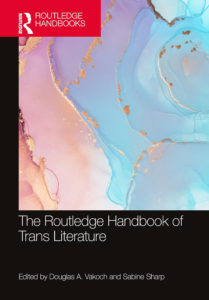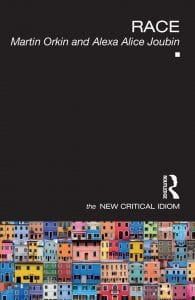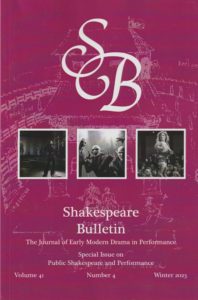When AI goes to theater with humans, it changes the dynamics of the social space. This article examines a case of audiences using an AI app on their phones to translate a sign language performance. Whom does the screen interface serve, and how do artificial intelligence tools affect theatrical publics across both the playing space and the playgoing space? Screens are a site where cultural and performative meanings are generated and negotiated.
Continue readingCategory Archives: Global Shakespeare
Performativity and Trans Literature

What is trans-ness in gender? One way to understand it is through the notion of performativity—how language and nonverbal communication tacitly or overtly affects social actions—is the core of all utterances and imaginative literature. Using this notion we can re-interpret literature from a more inclusive perspective.
Continue readingContemporary Transgender Performance of Shakespeare

Cross-gender roles and performances permeate many of Shakespeare’s plays. Viola presents as pageboy Cesario for most of the dramatic action in Twelfth Night. Falstaff escapes Ford’s house as the Witch of Brainford in The Merry Wives of Windsor. Rosalind ventures into the woods as Ganymede in As You Like It. In that same comedy, Celia (as Aliena), Phoebe, and Audrey were also played by boy actors in Shakespeare’s time. In Cymbeline, British princess Imogen dresses as a male servant, Fidele, on their quest to find their husband among the Roman soldiers. Read the open-access Borrowers and Lenders special issue on contemporary transgender performance of Shakespeare. Continue reading
The Value of Global Shakespeare
Shakespeare and East Asia (2021) explores distinctive themes in post-1950s Asian-themed performances and adaptations of Shakespeare. In this Snapshot, former Fulbright Scholar Alexa Alice Joubin discusses the book and the importance of wider research into Global Shakespeares. Continue reading
Five Things to Know about Global Shakespeare
A daptations of the classics not only creates channels between geographic spaces but also connects different time periods. Performing Shakespeare in different languages opens up new pathways to some often glossed over textual cruxes in Anglophone traditions.
daptations of the classics not only creates channels between geographic spaces but also connects different time periods. Performing Shakespeare in different languages opens up new pathways to some often glossed over textual cruxes in Anglophone traditions.
Take, The Tempest, for example. What exactly do Prospero and Miranda teach Caliban? The word “language” is ambiguous in act 1 scene 2 (Caliban: “You taught me language …”). It is often taken to mean his master’s language (a symbol of oppression). But it can also mean rhetoric and political speech writing, a new tool for him to change the world order. One way to excavate the different layers of meanings within the play and in performances is to compare different stage and film versions from different parts of the world. Caliban’s word, “language,” is translated by Christoph Martin Wieland as redden, or “speech” in German. In Japanese, it is rendered as “human language”, as opposed to languages of the animal or computer language.
Soviet Shakespeares
 In Stalinist Russia, just a few years before the Great Purges, Maxim Gorkii encouraged USSR writers during an All-Union Congress of Soviet Writers in 1934 to emulate Shakespeare as a model of socialist realism. This is only one of the better-known landmarks of Shakespeare’s afterlife in the Soviet cultural sphere. While there were ideologically homogeneous approaches to Shakespeare, there were also debates about the value of Shakespeare after the First World War.
In Stalinist Russia, just a few years before the Great Purges, Maxim Gorkii encouraged USSR writers during an All-Union Congress of Soviet Writers in 1934 to emulate Shakespeare as a model of socialist realism. This is only one of the better-known landmarks of Shakespeare’s afterlife in the Soviet cultural sphere. While there were ideologically homogeneous approaches to Shakespeare, there were also debates about the value of Shakespeare after the First World War.
Due to Karl Marx’s frequent references in his political treatises, Shakespeare held a significant place in a number of communist and other left-authoritarian countries, including China and the USSR. And although there were themes in Shakespeare that turned out to be inconvenient for communist ideology, other Shakespearean plays were put into service. In Part I of this volume of the Yearbook, the special section of chapters explores the vicissitudes of artistic and political uses of Shakespeare in Soviet culture and ideology after the October Revolution in 1917, including in some of the continuing resonances of those uses since the collapse of the Soviet Union. And while the real and perceived resistance to prevailing ideologies of Soviet directors has tended to capture recent critical attention, there is a wide range of Soviet and post-Soviet interpretations of Shakespeare.
The Culture of Citation and Global Shakespeare
 Global Shakespeare can be studied through two interrelated concepts: performance as an act of citation and the ethics of citation. Appropriating the classics carries strong ethical implications. A crucial, ethical component of appropriation is one’s willingness to listen to and be subjected to the demands of others. These metaphorical citations create moments of self and mutual recognition. Seeing the others within is the first step toward seeing oneself in others’ eyes. The act of citation is founded upon the premise of one’s subjectivity, the subject who speaks, and the other’s voice that one is channeling, misrepresenting, or appropriating. Continue reading
Global Shakespeare can be studied through two interrelated concepts: performance as an act of citation and the ethics of citation. Appropriating the classics carries strong ethical implications. A crucial, ethical component of appropriation is one’s willingness to listen to and be subjected to the demands of others. These metaphorical citations create moments of self and mutual recognition. Seeing the others within is the first step toward seeing oneself in others’ eyes. The act of citation is founded upon the premise of one’s subjectivity, the subject who speaks, and the other’s voice that one is channeling, misrepresenting, or appropriating. Continue reading
Teaching King Lear in a Global Context

How might we engage with the “essence” of King Lear, or “Learness,” in a networked culture? Juxtaposing the clips of the division-of-the-kingdom scene from different films allows us to reexamine our perceived ethical burden to explain Lear’s problems away. The scene in Peter Brook’s 1971 film is dominated by close-ups of Lear and other characters, framing Paul Scofield’s Lear as a solemn statue. Peter Brook’s 1962 RSC production and subsequent 1971 film of King Lear engages with the theme of ecocriticism through an apocalyptic mise-en-scène.
In contrast to Laurence Olivier’s Lear in Elliott’s 1983 film, who laughs off Cordelia’s initial response, Scofield’s Lear speaks methodically and remains stern throughout the scene, which ends with him calmly banishing Cordelia. Cordelia’s aside is cut, thereby diminishing the weight of a potentially revelatory moment as well as Cordelia’s self-discovery.
Performing Commemoration: The Cultural Politics of Locating Tang Xianzu and Shakespeare

Cultural memory is actively constructed through embodied and political performances. Tang Xianzu and William Shakespeare, two “national poets” of unequal global stature, have recently become vehicles for British and Chinese cultural diplomacy and exchange during their quatercentenary in 2016. The culture of commemoration is a key factor in Tang’s and Shakespeare’s positions within world theatre. Performances of commemoration take a wide range of approaches from grass-root events to government-sponsored festivals. With a comparative scope that explores the afterlives of the two dramatists, this cluster of essays examines commemorative practices, the dynamics of artistic fame, comparability of different dramatic traditions, and transformations of performance styles in socio-historical contexts. Continue reading
Race and the Epistemologies of Otherness
 Excerpted from chapter 5 of Race by Martin Orkin and Alexa Alice Joubin. New Critical idiom Sereis. London: Routledge, 2019, pp. 193-227. Full text available online
Excerpted from chapter 5 of Race by Martin Orkin and Alexa Alice Joubin. New Critical idiom Sereis. London: Routledge, 2019, pp. 193-227. Full text available online
When confronted with the unknown, many societies tend to transfer observations of unfamiliar phenomena onto their mental map of what is already known. Race as a category is entangled with empirical knowledge, misinformation, and ideology, all of which seek to justify and sustain particular beliefs. Knowledge about otherness is socially constructed. Knowledge of race results from taxonomical observations made for colonial, medical, bureaucratic, or other purposes such as political movements. Continue reading


